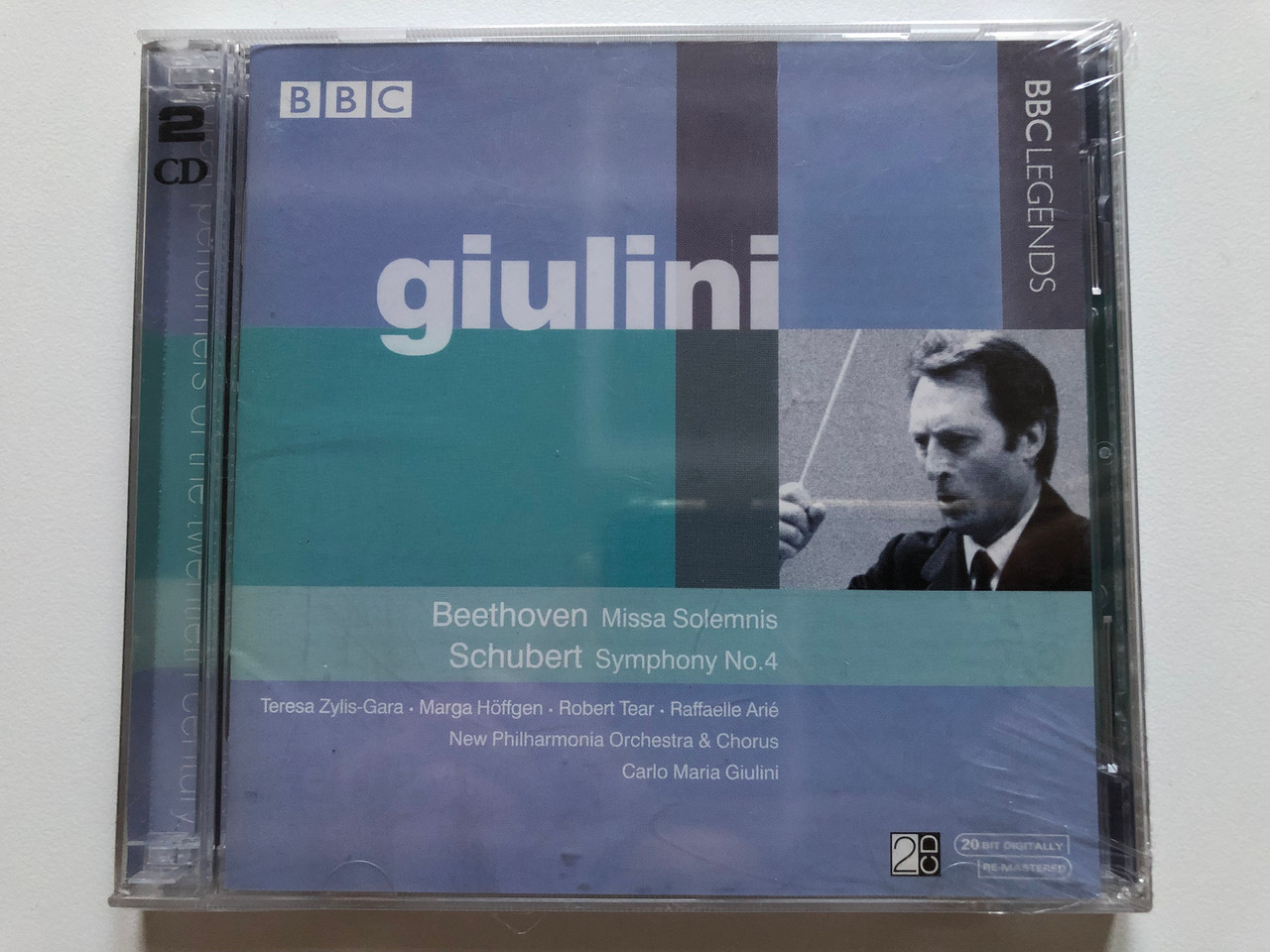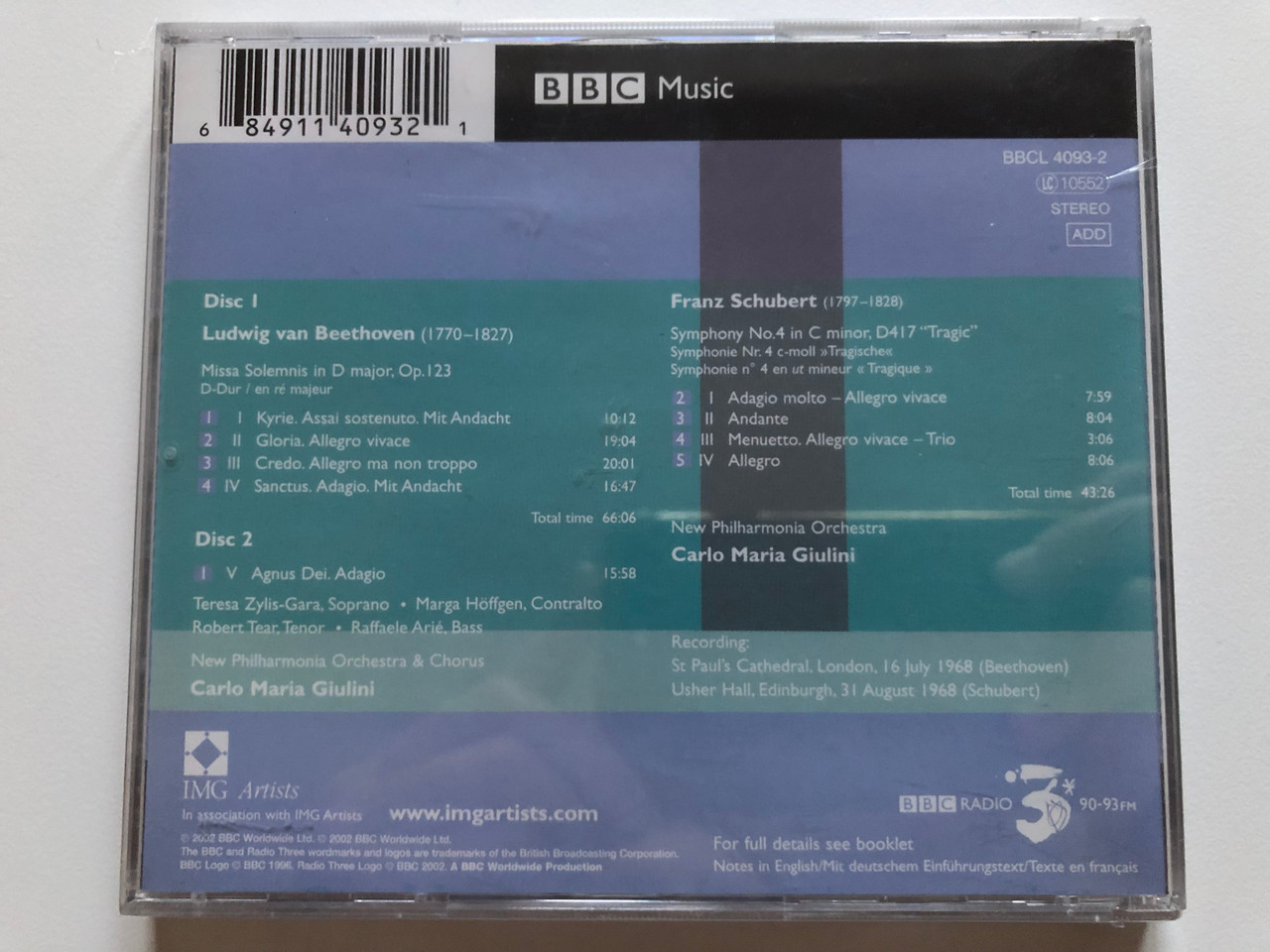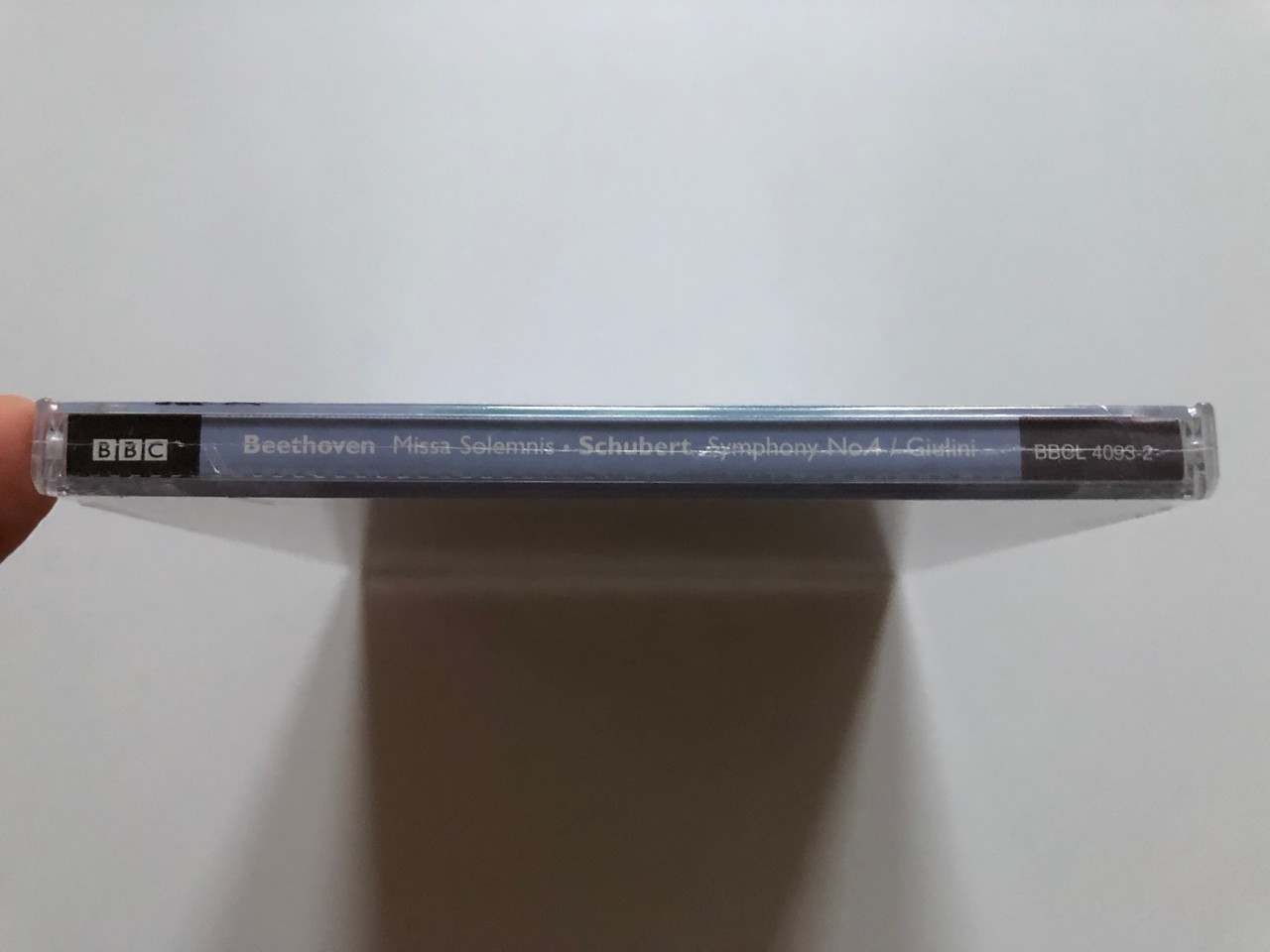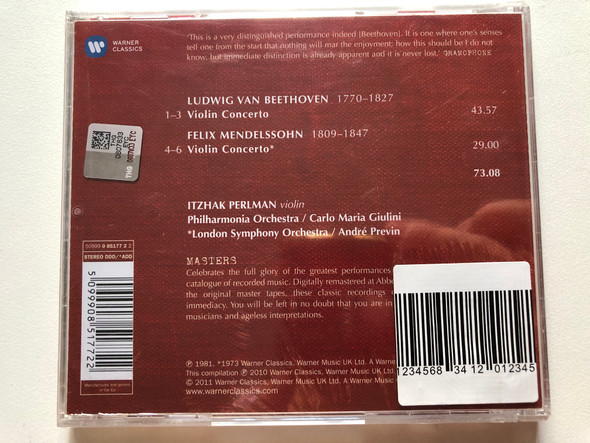Description
Giulini - Beethoven: Missa Solemnis, Schubert: Symphony No. 4 / Teresa Zylis-Gara, Marga Hoffgen, Robert Tear, Raffaelle Arie, New Philharmonia Orchestra & Chorus, Carlo Maria Giulini / BBC Music 2x Audio CD 2002 Stereo / BBCL 4093-2
UPC 684911409321
Carlo Maria Giulini Cavaliere di Gran Croce OMRI (Italian pronunciation: [ˈkarlo maˈriːa dʒuˈliːni]; 9 May 1914 – 14 June 2005) was an Italian conductor. From the age of five, when he began to play the violin, Giulini's musical education was expanded when he began to study at Italy's foremost conservatory, the Conservatorio Santa Cecilia in Rome at the age of 16. Initially, he studied the viola and conducting; then, following an audition, he won a place in the Orchestra dell'Accademia Nazionale di Santa Cecilia.
Although he won a conducting competition two years later, he was unable to take advantage of the prize, which was the opportunity to conduct, because of being forced to join the army during World War II despite being a pacifist. As the war was ending, he hid until the liberation to avoid continuing to fight alongside the Germans. While in hiding, he married his girlfriend, Marcella, and they remained together until her death in 1995. Together, they had three children. After the 1944 liberation, he was invited to lead what was then known as the Augusteo Orchestra (now the Santa Cecilia Orchestra) in its first post-Fascist concert, and quickly other conducting opportunities came along. These included some of the world's major orchestras including the Chicago Symphony Orchestra, London's Philharmonia Orchestra, the Vienna Philharmonic. His career spanned 54 years with retirement coming in 1998. He died in Brescia, Italy, at 91 years of age.
The Missa solemnis in D major, Op. 123, is a Solemn Mass composed by Ludwig van Beethoven from 1819 to 1823. It was first performed on 7 April 1824 in Saint Petersburg, Russia, under the auspices of Beethoven's patron Prince Nikolai Galitzin; an incomplete performance was given in Vienna on 7 May 1824, when the Kyrie, Credo, and Agnus Dei were conducted by the composer. It is generally considered one of the composer's supreme achievements and, along with Bach's Mass in B minor, one of the most significant Mass settings of the common practice period.
Written around the same time as his Ninth Symphony, it is Beethoven's second setting of the Mass, after his Mass in C major, Op. 86. The work was dedicated to Archduke Rudolf of Austria, archbishop of Olmütz, Beethoven's foremost patron as well as pupil and friend. The copy presented to Rudolf was inscribed "Von Herzen—Möge es wieder—Zu Herzen gehn!" ("From the heart – may it return to the heart!")
Franz Schubert's Symphony No. 4 in C minor, D 417, called by its composer the Tragic (German: Tragische), was completed in April 1816, a year after his Third Symphony, when he was 19 years old. However, it was not premiered until November 19, 1849, in Leipzig, more than two decades after Schubert's death.
| Label: | Erato – 8573-80233-2 |
|---|---|
| Format: |
3 x CD, Album, Box Set
|
| Country: | Europe |
| Released: |
2002 |
| Genre: | Classical |
| Style: | Opera, Baroque |
Tracklist:
| Alcina, Opera, HWV 34 | |||
| 1-1 | Sinfonia | 2:52 | |
|
Atto I |
|||
| 1-2 | Minuet | 1:06 | |
| 1-3 | Musette | 1:51 | |
| 1-4 | Oh Dei! Quivi Non Scorgo Alcun Sentiero! |
0:57 | |
| 1-5 | O S'apre Al Riso | 4:33 | |
| 1-6 | Questo E' Il Cielo De' Contenti | 2:30 | |
| 1-7 | Ecco L'infido | 0:55 | |
| 1-8 | Dì', Cor Mio, Quanto T'Amai | 7:07 | |
| 1-9 | Generosi Guerrier | 0:37 | |
| 1-10 | Chi M'Insegna Il Caro Padre? | 3:09 | |
| 1-11 | Mi Ravvisi | 0:49 | |
| 1-12 | Di Te Mi Rido | 4:08 | |
| 1-13 | Qua Dunque Ne Veniste | 0:38 | |
| 1-14 | È Gelosia | 4:01 | |
| 1-15 | Io Dunque | 1:35 | |
| 1-16 | La Cerco In Vano | 2:46 | |
| 1-17 | Ah, Infedele, Infedel! | 0:49 | |
| 1-18 | Si, Son Quella! | 6:51 | |
| 1-19 | Se Nemico Mi Fossi | 0:47 | |
| 1-20 | Bradamante Favella? La Bocca Vaga | 3:29 | |
| 1- 21 | Fuggi Cor Mio | 0:50 | |
| 1-22 | Tornami A Vagheggiar | 4:55 | |
|
Atto II |
|||
| 2-1 | Col Celarvi A Chi V'Ama | 1:55 | |
| 2-2 | Qual Portento Mi Richiama | 1:51 | |
| 2-3 | Ah, Bradamante! | 0:47 | |
| 2-4 | Pensa A Chi Geme D'Amor | 5:36 | |
| 2-5 | Qual Adio Ingiusto Contro Me? | 1:31 | |
| 2-6 | Vorrei Vendicarmi | 4:07 | |
| 2-7 | Chi Scopre Al Mio Pensiero | 0:16 | |
| 2-8 | Mi Lusinga Il Dolce Affetto | 7:16 | |
| 2-9 | S'Acquieti Il Rio Sospetto | 1:04 | |
| 2-10 | E La Tua Pace | 7:12 | |
| 2-11 | Non Scorgo Nel Tuo Viso | 0:55 | |
| 2-12 | Mio Bel Tesoro | 6:23 | |
| 2-13 | Regina, Io Cerco In Vano | 0:51 | |
| 2-14 | Tra Speme E Timore | 3:21 | |
| 2-15 | Regina, Sei Tradita | 0:34 | |
| 2-16 | Ah! Mio Cor! | 12:42 | |
| 2-17 | Or, Che Dici, Morgana? | 0:40 | |
| 2-18 | E Un Folle | 4:25 | |
| 2-19 | Eccomi, A' Piedi Tuoi | 0:51 | |
| 2-20 | Verdi Prati | 4:16 | |
| 2-21 | Ah! Ruggiero Crudel | 2:48 | |
| 2-22 | Ombre Pallide | 6:29 | |
|
Atto III |
|||
| 3-1 | Sinfonia | 0:42 | |
| 3-2 | Voglio Amar E Disamar | 0:42 | |
| 3-3 | Credete Al Mio Dolore | 6:55 | |
| 3-4 | M'Inganna, Me N'avveggo | 0:19 | |
| 3-5 | Un Momento Di Contento | 4:35 | |
| 3-6 | Molestissimo Incontro! | 1:07 | |
| 3-7 | Ma Quando Tornerai | 4:31 | |
| 3-8 | Tutta D'Armate Squadre | 0:25 | |
| 3-9 | Sta Nell'lrcana | 5:47 | |
| 3-10 | Vanne Tu Seco Ancora | 0:18 | |
| 3-11 | All'Alma Fedel | 4:16 | |
| 3-12 | Niuna Forza Lo Arresta | 0:38 | |
| 3-13 | Mi Restano Le Lagrime | 8:18 | |
| 3-14 | Già Vicino E' Il Momento | 1:04 | |
| 3-15 | Barbara! Io Ben Lo So | 3:10 | |
| 3-16 | Le Lusinghe | 0:37 | |
| 3-17 | Non E Amor, Ne Gelosia | 5:24 | |
| 3-18 | Ah Mio Ruggier. Che Tenti? | 0:38 | |
| 3-19 | Dall'orror Di Notte Cieca | 2:23 | |
| 3-20 | Entrèe | 2:36 | |
| 3-21 | Tamburino | 1:01 | |
| 3-22 | Dopo Tante Amare Pene | 0:37 |
- Adapted By (Text) [Libretto] – Riccardo Broschi
- Bass Vocals [Melisso] – Laurent Naouri
- Composed By – Handel
- Consultant [Language] – Rita De Letteriis
- Contralto Vocals [Bradamante] – Kathleen Kuhlmann
- Design [Booklet] – Anne-Sophie Audouin
- Design [Cover] – De L'Esprit
- Design [Sets And Cstumes] – Tobias Hoheisel
- Directed By – William Christie
- Directed By, Liner Notes – Robert Carsen
- Engineer [Sound] – Joël Soupiron
- Ensemble – Les Arts Florissants
- Libretto By [After] – Ludovico Ariosto
- Lighting – Jean Kalman
- Liner Notes – Ivan A. Alexandre
- Liner Notes [English Libretto Translation] – Harriet Mason
- Liner Notes [English Translation] – Andrew Huth
- Liner Notes [French Libretto Translation] – Michel Orcel
- Liner Notes [French Translation] – Virginie Bauzou
- Liner Notes [German Libretto Translation] – Martina Seeber
- Liner Notes [German Translation] – Almut Lenz-Konrad
- Mezzo-soprano Vocals [Ruggiero] – Susan Graham (2)
- Music By – George Frideric Handel
- Orchestra [First Violin] – Hiro Kurosaki
- Photography By – Michel Szabo, Thierry Cohen
- Producer, Edited By – Arnaud Moral
- Product Manager [Erato] – Uta Winkler
- Recorded By [Assistant] – Christian Koeler, Robert Francis (2)
- Recorded By [Assistant], Edited By – Alain Joubert
- Soprano Vocals [Alcina] – Renée Fleming
- Soprano Vocals [Morgana] – Natalie Dessay
- Soprano Vocals [Oberto] – Juanita Lascarro
- Tenor Vocals [Oronte] – Timothy Robinson


























